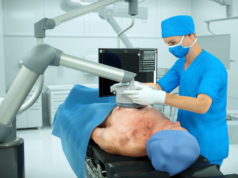SpectraWAVE has announced US Food and Drug Administration (FDA) 510(k) clearance of its flagship intravascular imaging system, HyperVue. The system combines ‘DeepOCT’ images and near infrared spectroscopy (NIRS) to support physicians optimising coronary stenting in the cath lab.
“This is a landmark day for SpectraWAVE, but more importantly, a critical step towards improving outcomes for patients with coronary artery disease,” said Eman Namati, chief executive officer of SpectraWAVE. “Our proprietary DeepOCT-NIRS imaging system pushes the technological limits of optical coherence tomography—both in image quality and depth—while combining it with spectroscopy for the first time, packaging both into a no-flush catheter with an artificial intelligence-powered user experience. With this regulatory clearance, we are excited to begin the transition to a commercial entity and launch our product.”
“Clinical evidence strongly suggests that patients benefit from intravascular imaging-guided stent optimisation,” said Ziad A Ali (St Francis Hospital and Heart Center, Roslyn, USA). “After completing the first-in-human procedures, it is clear SpectraWAVE has built something truly special with a combination of DeepOCT and NIRS, paired with a workflow and AI-enabled image analysis that will prove beneficial for precise and optimal coronary artery disease treatment.
“The DeepOCT technology provides exceptional visualization of critical structures such as the external elastic membrane and calcium, while NIRS removes the guesswork in classifying lipidic plaques. I believe the HyperVue system will enable comprehensive and seamless PCI optimisation, but also act as a trailblazing tool for future applications in high-risk vulnerable plaque detection and treatment.”
Initial cases from the first-in-human study have been conducted at the Department of Research Innovation, Angiografia de Occidente in Colombia, South America, under the guidance of site principal investigators Antonio Dager, interventional cardiologist and director of the Structural Heart Program, as well as study principal investigator Ziad Ali.










